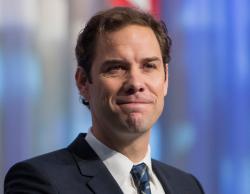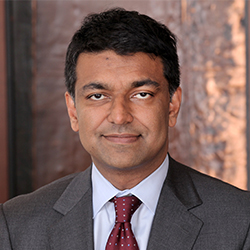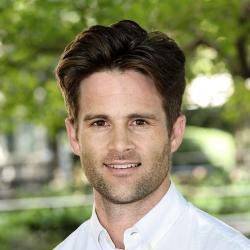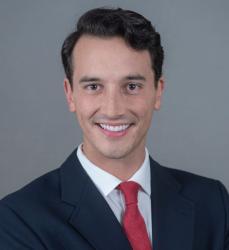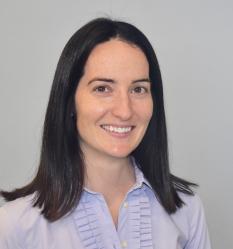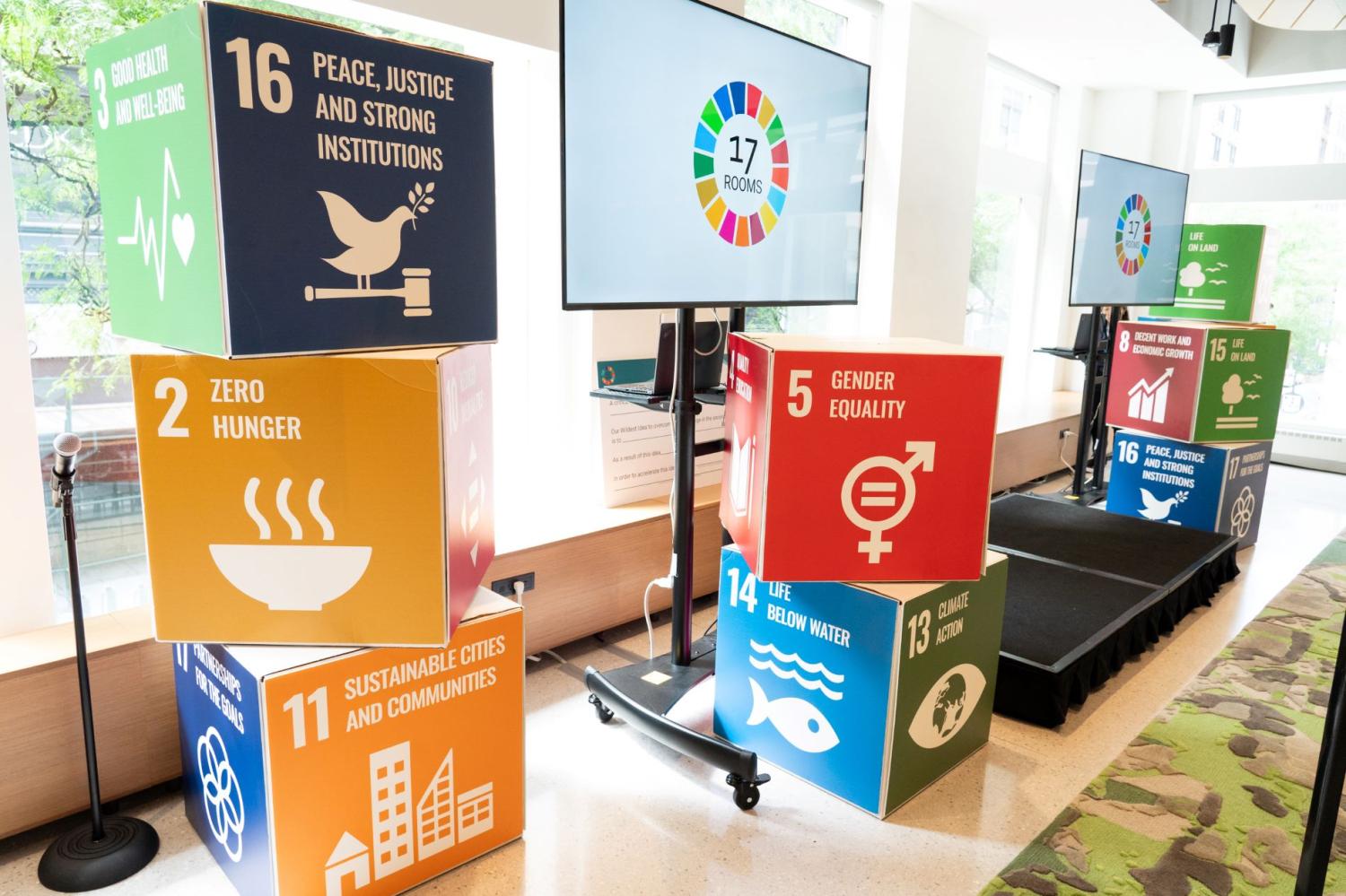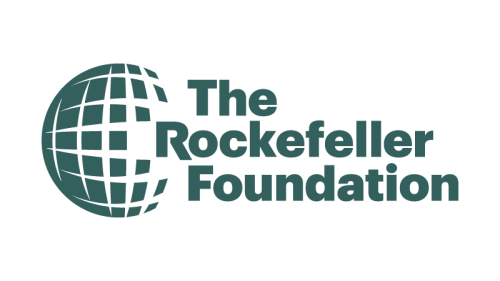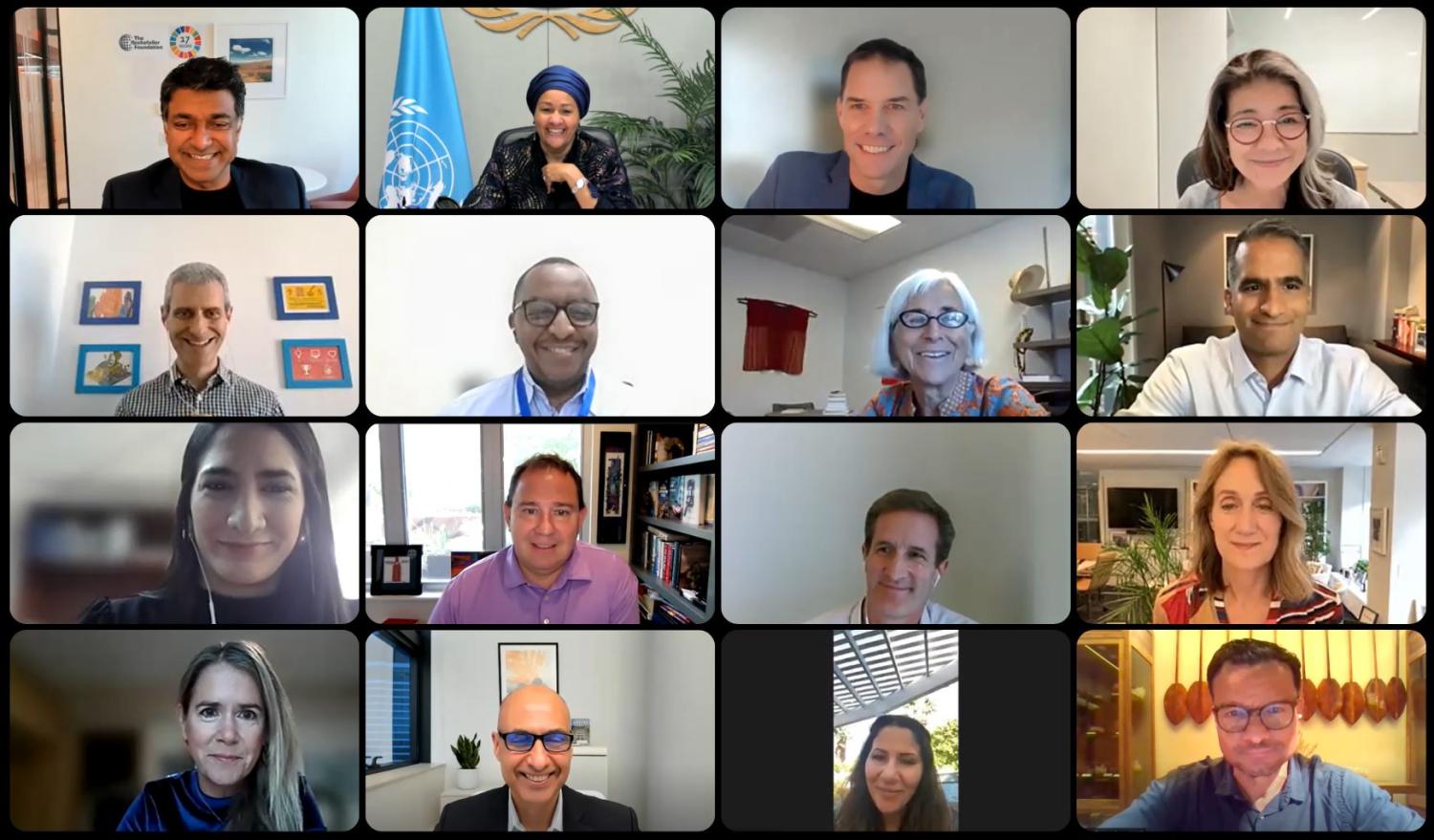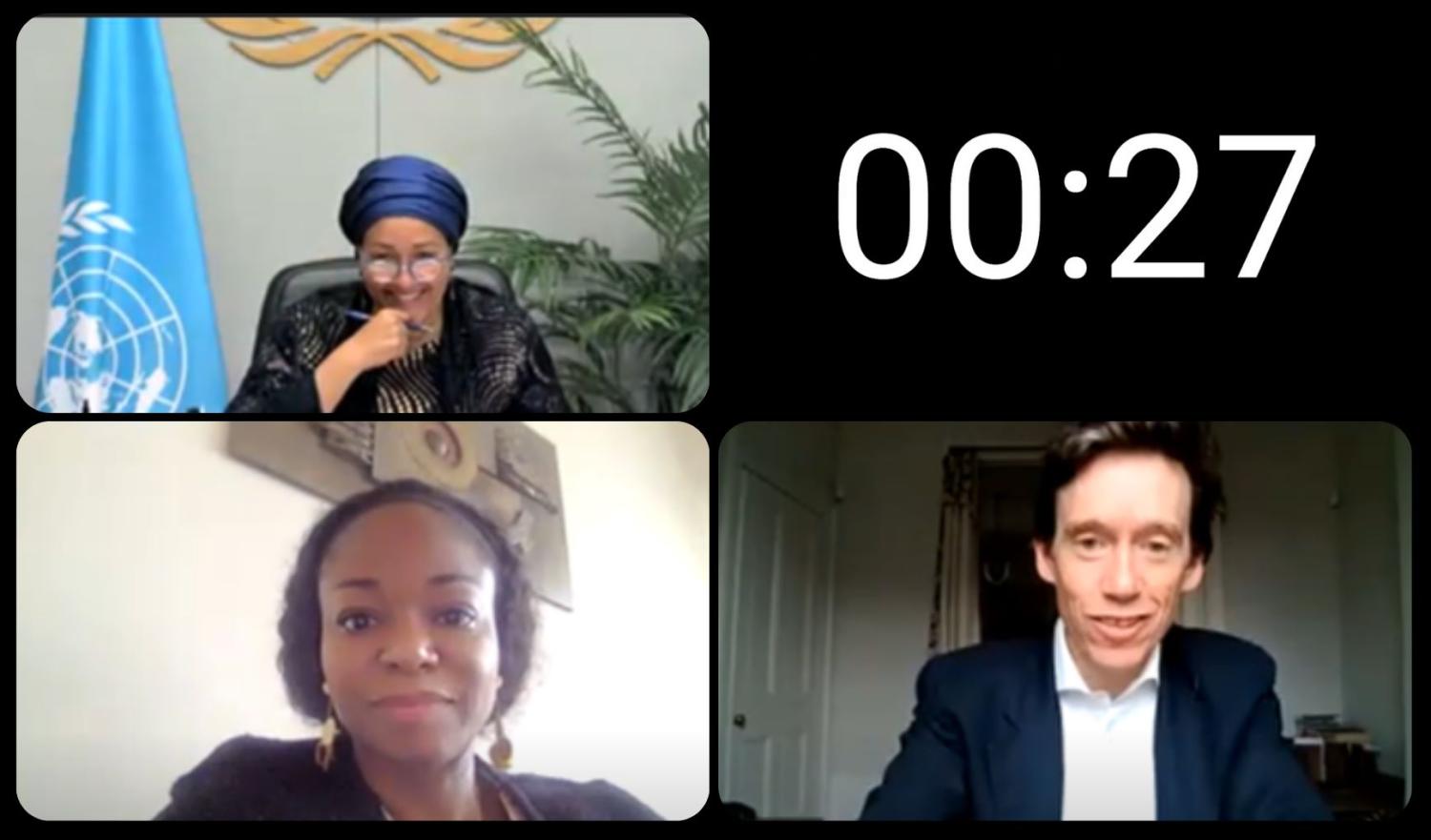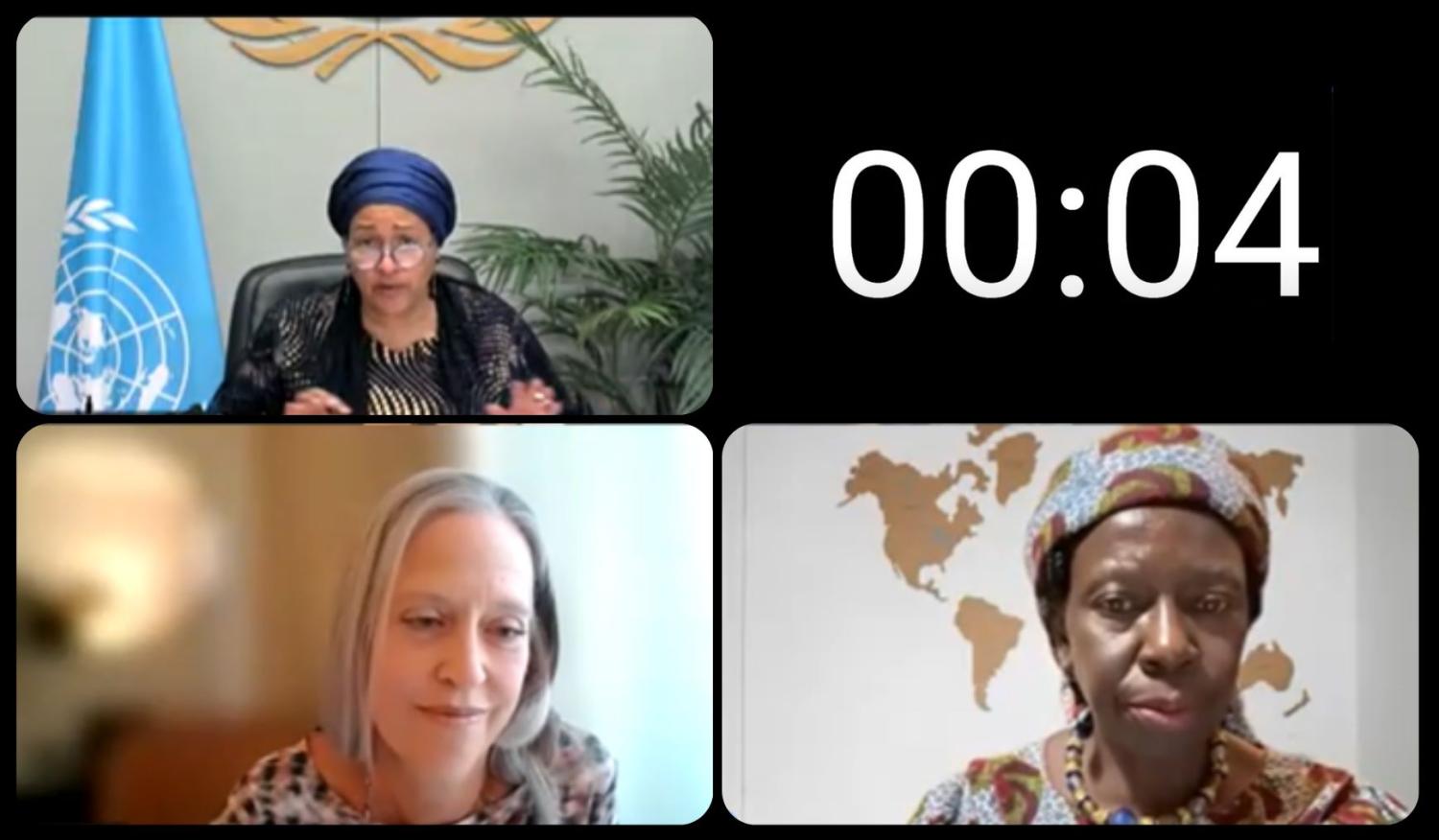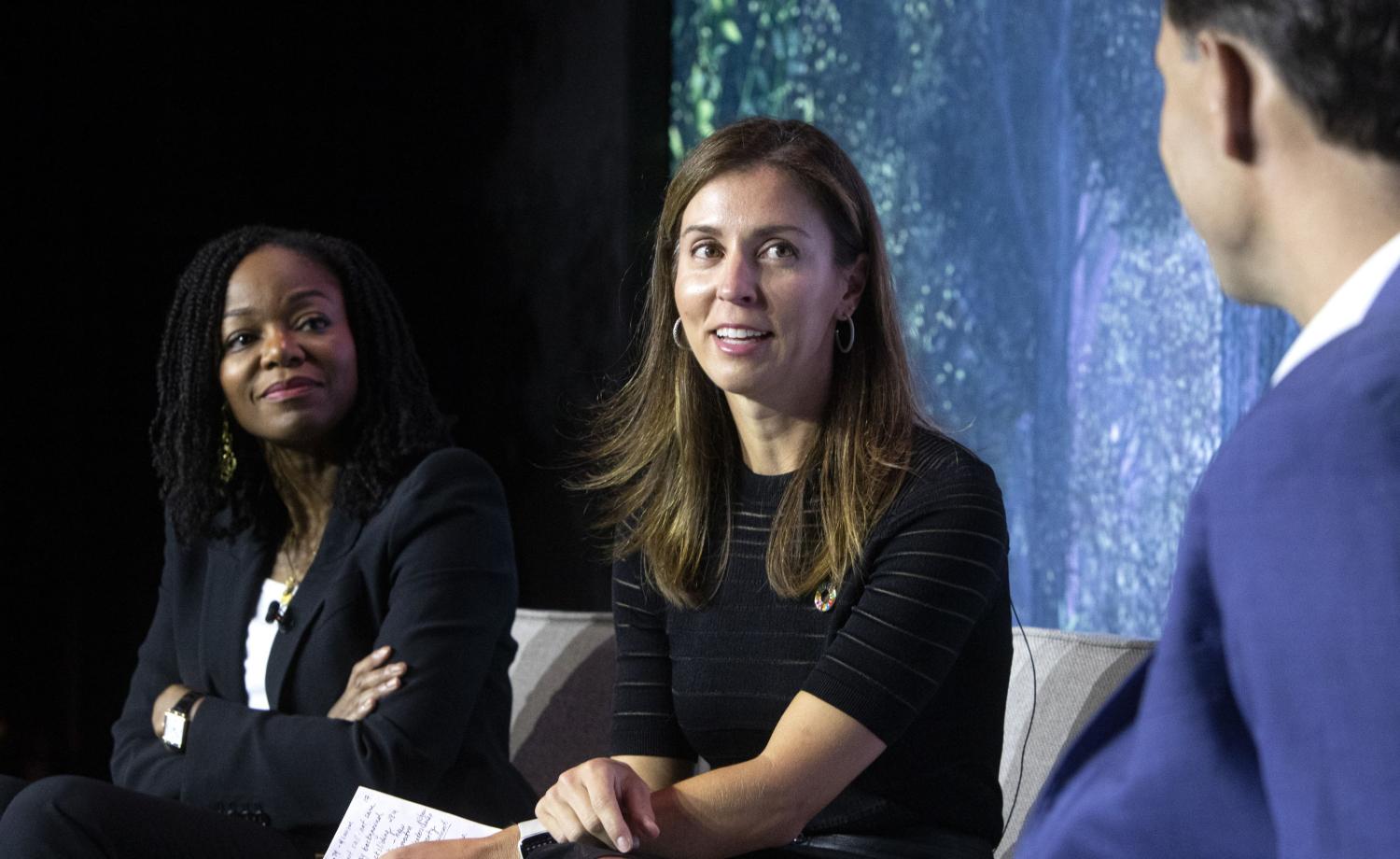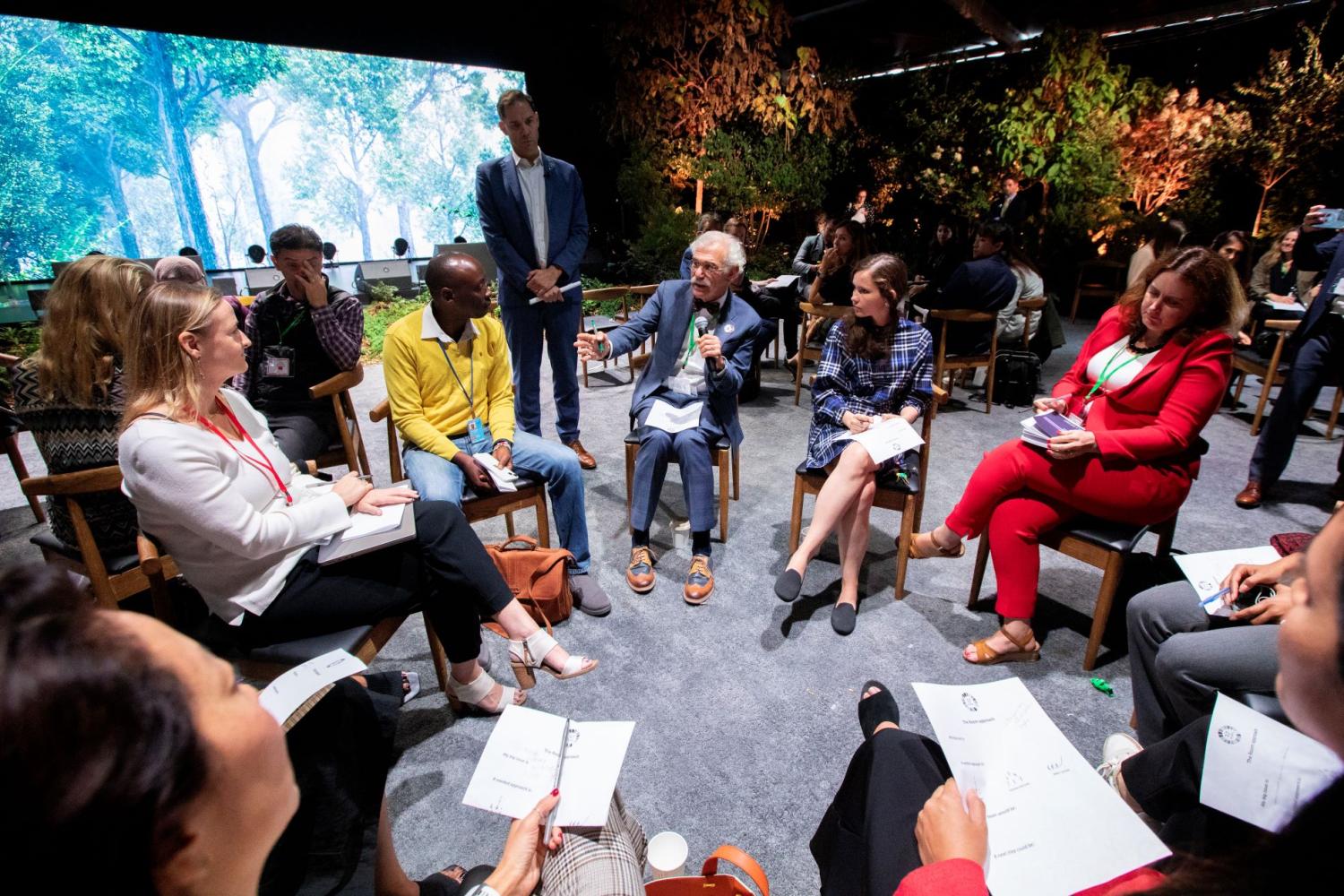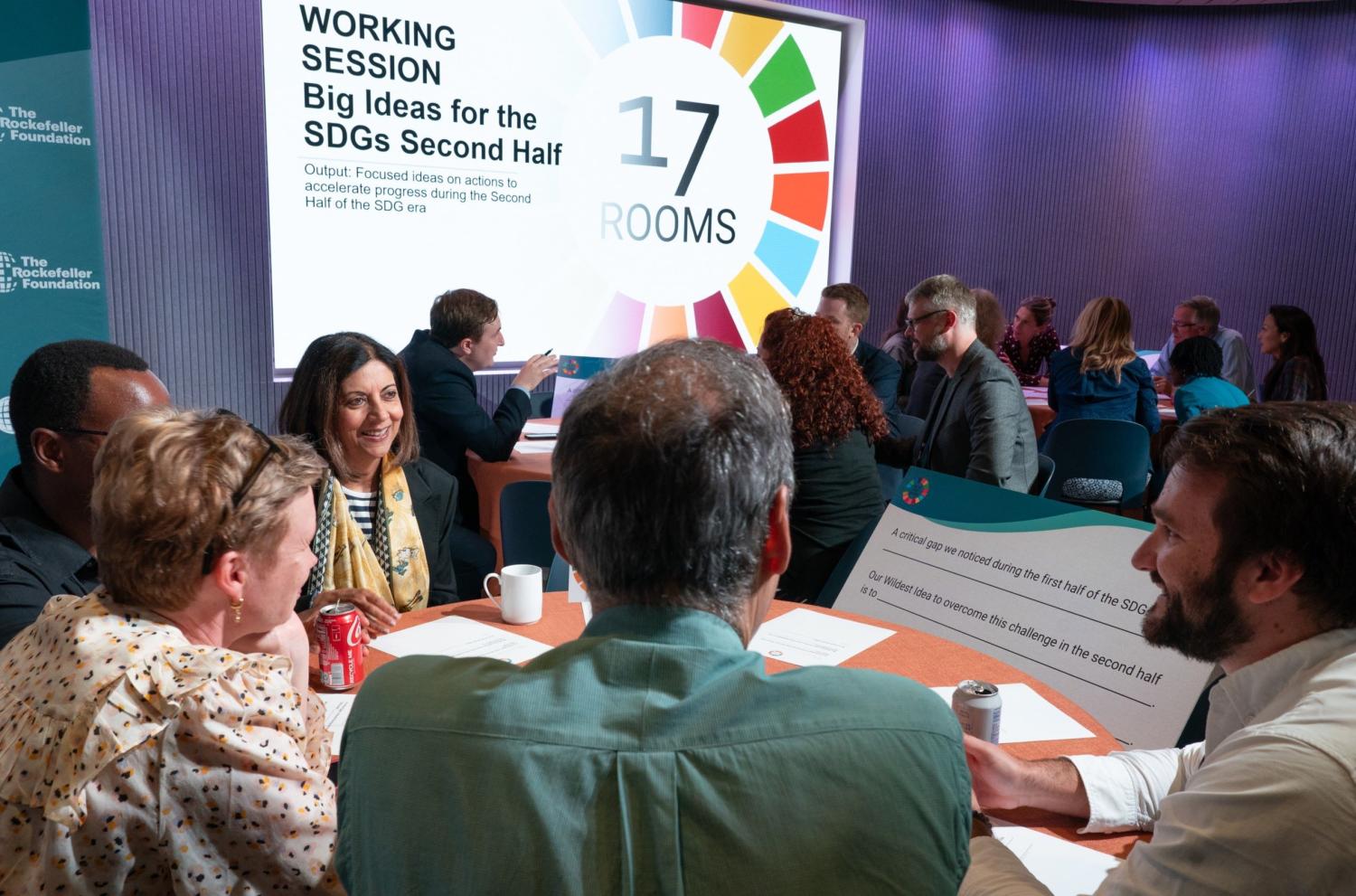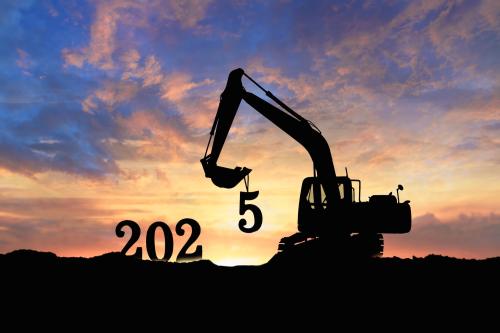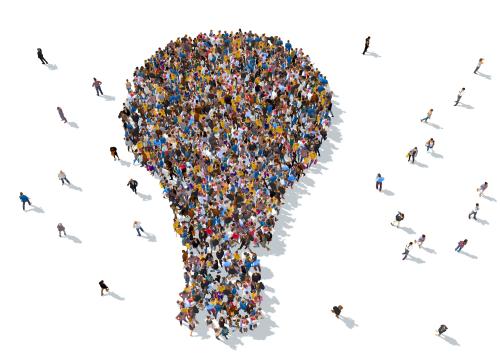The story of the Sustainable Development Goals’ second half out to 2030 is yet to be written. In practical terms, much of the story will boil down to groups of people getting together to listen, debate, and act on concrete next steps. This is the underlying spirit of 17 Rooms. In the 2023 annual flagship, 17 highly curated working groups, one per SDG, came together to craft new forms of actionable, collaborative leadership over a 12-to-18-month horizon. Their efforts addressed priorities like confronting the multi-dimensional challenge of climate change, harnessing frontier technologies, elevating local approaches to global issues, and reframing challenges to inspire action. All Rooms had the opportunity to present their work-in-progress to U.N. Deputy Secretary-General Amina Mohammed for her live feedback. The flagship built on the growing success of previous annual cohorts, while also inspiring diverse bottom-up “17 Rooms-X” exercises around the world. In 2024, 17 Rooms will continue to update its approaches, with likely emphasis on fostering big ideas for breakthroughs toward 2030 SDG outcomes and special attention toward issues of climate and artificial intelligence (AI).
In Partnership With
The flagship built on the growing success of previous annual cohorts, while also inspiring diverse bottom-up '17 Rooms-X' exercises around the world.
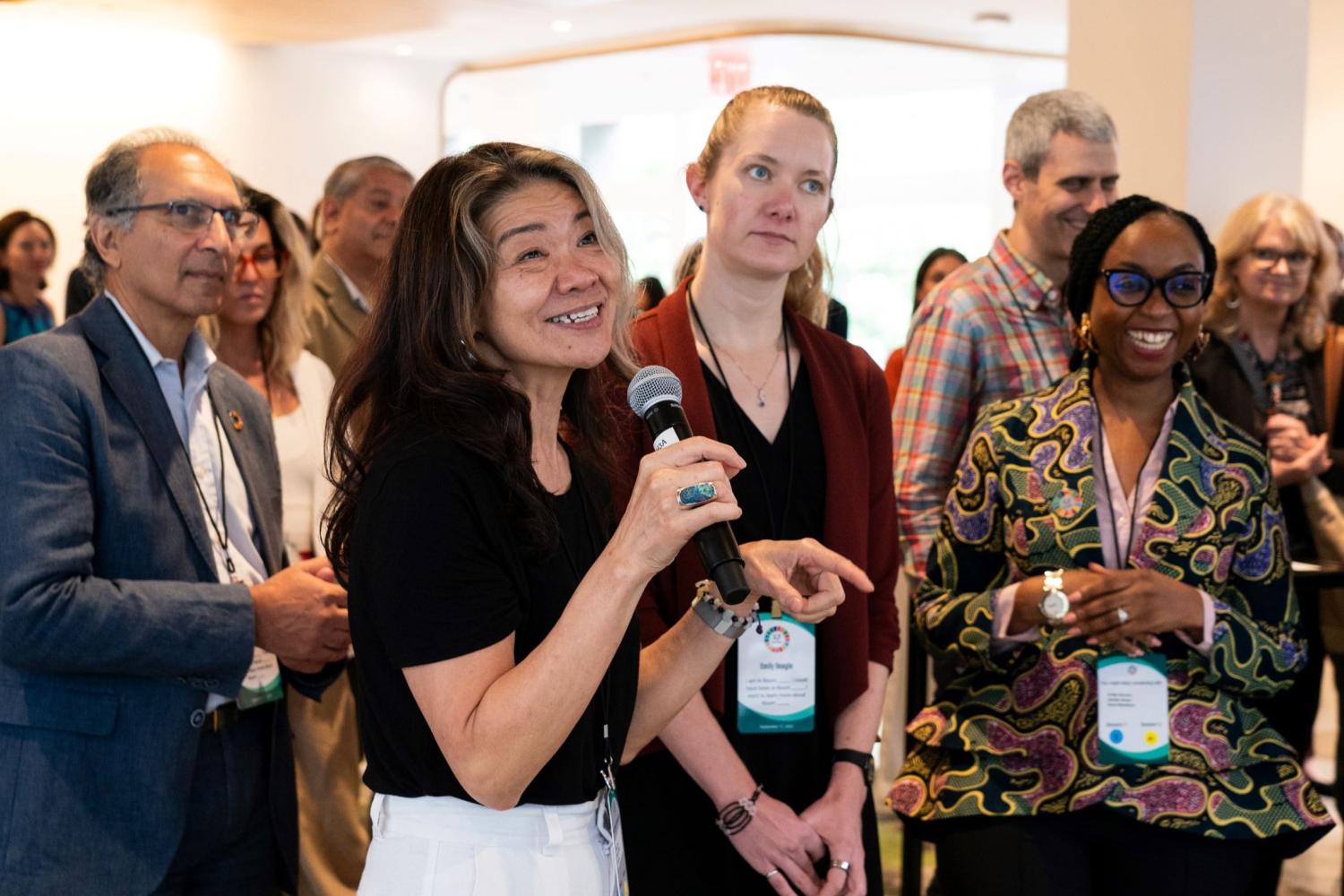
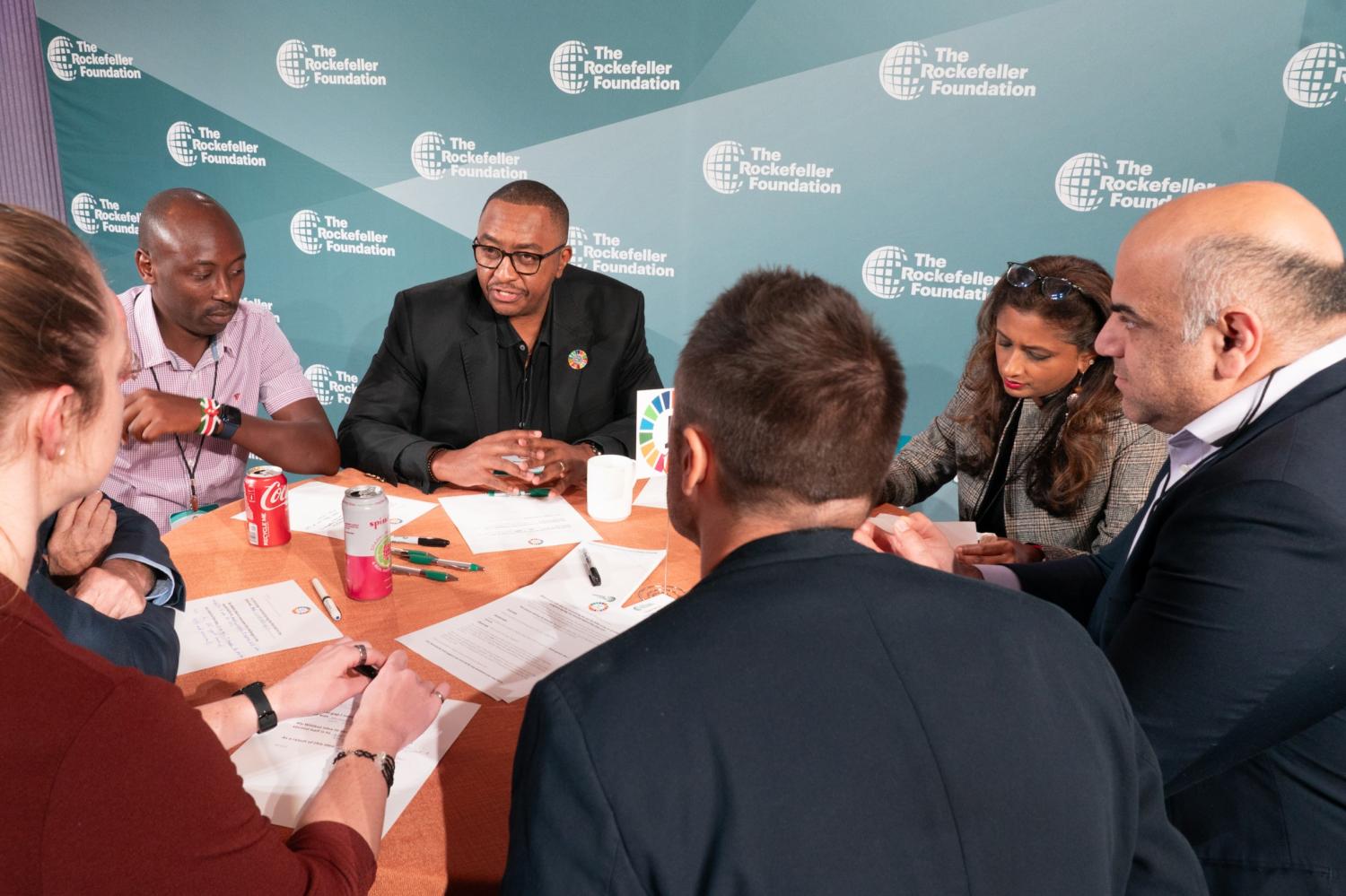
Introduction
17 Rooms keeps experimenting and innovating to build a platform that can help people connect around shared insights and joint actions.
The story of the Sustainable Development Goals’ second half out to 2030 is yet to be written. Since the goals were established in 2015, many efforts have resulted in progress. But the world is still falling short on its stated ambitions. Driving better collaborative outcomes across the economic, social, and environmental dimensions of sustainable development will require new forms of leadership.
In practical terms, much of the story will boil down to groups of people getting together to listen, debate, and act on concrete next steps. This is the underlying spirit of 17 Rooms.
As an entrepreneurial initiative, 17 Rooms keeps experimenting and innovating to build a platform that can help people connect around shared insights and joint actions. Within both the annual flagship, which is the focus of this report, and among the diverse community-based 17 Rooms-X efforts around the globe, we have noted the human factor as foundational—people finding new ways to work together to tackle frontier challenges, deploy new technology, and advance new forms of understanding.
In 2023, the 17 Rooms flagship convened more than 320 people from around the world, between May and October, typically in groups of 10-20 people per Room (see Appendix for list of participants). As in previous years, each Room focused on a targeted action agenda within their respective SDG domain. Rooms mostly met virtually, although some had the opportunity to meet in person too. In each case, the Room offered a neutral space in which participants could exchange views and coordinate around priority next steps that could be advanced within 12-18 months. In what has become an annual tradition, all Rooms had the opportunity mid-September to provide a live readout on their work to U.N. Deputy Secretary-General (DSG) Amina Mohammed, who provided real-time feedback to each group as they finalized their plans (see Box 1).
This report provides a summary of all the Rooms’ final plans.
Box 1. UN Deputy Secretary-General provides live feedback during 17 Rooms annual virtual summit
In September’s annual virtual summit, all 17 flagship Rooms presented a rapid summary of their draft action plans to the U.N. Deputy Secretary-General Amina Mohammed for her live feedback, helping to inform each group’s firming-up of next steps.
Major themes
A handful of common themes stood out, including: climate change, frontier technologies, local approaches to global challenges, and reframing issues to inspire action.
The final Room action agendas are all summarized in the Action Agenda Summaries section below. In assessing the 2023 cohort’s overall efforts, a handful of common themes stood out, including: climate change, frontier technologies, local approaches to global challenges, and reframing issues to inspire action.
The multi-pronged challenge of climate change
Climate change is an ecological issue affecting all aspects of life on earth. It is an economic issue challenging institutions’ ability to distribute necessary capital and equitably distribute opportunities. It is a technical issue requiring rapid deployment of context-calibrated technologies at global scale. It is a societal issue contributing to instability in many geographies and disproportionately affecting vulnerable populations. It is a political issue requiring diverse stakeholders to agree on specific problems and common solutions. These intersecting climate challenges are playing out across cities, countries, and continents.
Several Rooms targeted actions at points of intersection between climate and other SDGs. Room 8, for example, recognized the urgent need to create employment opportunities for young people in developing countries amid a time of global economic strain and increasing climate-related environmental disasters. To inform national policymakers and public debates, they drafted a plan for a global Green Jobs Index to standardize the way countries track the development of skills, knowledge, and opportunities in green sectors. Meanwhile Room 4, bolstered by the momentum of 2022 Room members’ leadership linking climate change and education policy in the leadup to the United Nations Climate Change Conference (COP28) and beyond (see Box 2), focused on practical actions to scale up ambitious, realistic, and inclusive climate education globally. The Room launched a new global repository of 100 outstanding teacher-led climate education solutions and crafted a strategy to incorporate the voices and experiences of teachers and climate educators in the design and implementation of national climate and education plans.
Recognizing climate-induced stressors on caregiving responsibilities that largely fall on women for children, the elderly, and the ill, policy experts and city-level decisionmakers came together in Room 5 to design a global network of city-level learning labs. Starting in Barcelona, Bogota, and Toronto, a new initiative will test and refine interventions to help cities address care needs in the context of climate change. Also focusing on the city level, Room 3 identified opportunities to integrate digital assets to create a near-real-time data, modeling, and decisionmaking loop—also known as a digital twin. These can inform nature-based solutions and built cooling interventions capable of protecting the most vulnerable urban populations from adverse health and social effects of climate-induced extreme heat events. The group is planning an initial pilot in Santiago, Chile to assess impact and inform a path to scale.
Other Rooms sought to reimagine economic conditions required to incentivize developing country agency and participation in climate and energy transitions. Renewable energy and development experts in Room 7 insisted the ambition to deliver clean and reliable energy access globally will only be achieved if energy solutions move beyond technical realms and become human-centered and locally calibrated. Room 13 rallied around the importance of fair market access and equitable finance for local actors in developing countries to play a global leadership role in carbon removal, leveraging their available land, growing workforces, and renewable energy potential.
Deploying frontier technologies
Several Rooms looked at how frontier technologies can offer new pathways to advance the SDGs. A common theme centered on making resources and decisionmaking power available to people who need them most. In Room 1, a cross section of leaders from public, private, and non-profit sectors jointly recognized the fast-evolving digital technology systems that enable cash transfers to be delivered quickly and efficiently at scale, alongside the accumulation of evidence on the efficacy of cash transfers in reducing extreme poverty. The Room developed a concept for a new global fund to empower rapid scaling and delivery of digital cash transfers to dramatically reduce extreme poverty by 2030—which could also offer a central plank in efforts to promote climate adaptation.
Room 9 developed a plan to build digital infrastructure and protocols for an African climate-verse—a collaborative, cross-sector, and continent-wide effort to pool climate data and modeling tools that help decisionmakers understand the relationship between climate risk and issues such as public health, food security, and community resilience. Core to the Room’s approach is investing in professional capacity so that the digital public infrastructure is built in Africa, by Africans, for Africa.
Dramatic improvements in measurement technology and the pursuit of common standards informed the work of multiple Rooms, often anchored in private sector-led innovations. Room 12 was motivated by innovations in impact accounting and frequent frustration with the fragmentation of sustainability efforts in the textiles industry. The Room convened stakeholders across the value chain—from apparel brands to re-use platforms, recyclers, and consumer experts—to develop industry-standard approaches to impact accounting, sorting, recycling, and re-use practices.
Room 14 convened ocean-focused experts in science, data, finance, and policy to identify key steps for harnessing breakthroughs in ocean measurement technologies to improve ocean management and decisionmaking. The group prioritized aggregating existing data resources, creating mechanisms to address information gaps, and elevating case studies that could drive change, including on pressing issues like coastal protection and deep-sea mining. In Room 15, leaders in regenerative agriculture, commodity markets, biodiversity conservation, and development finance gathered to discuss how to leverage innovations in AI and decentralized computing to verify, trace, and value the sustainability characteristics of differentiated commodities, beginning with specialty coffee as an entry point.
Advancing local approaches to global challenges
A central challenge of SDG implementation lies in bridging the goals’ global ambitions with ground-level priorities and systems. Fortunately, the SDGs embody challenges that local communities typically already care about, even if not using the formal language of the goals. Recognizing this, leaders from community foundations across North America came together in Room 11 to show how adopting the SDGs to organize, coordinate, and measure community-level action and impact can unlock new bottom-up opportunities. In 2024, Room members will launch a community of practice dedicated to distilling and promoting relevant learnings for a broader audience of community foundations around the world.
In Room 17, practitioners and philanthropists advocated for the development of local agency and leadership as the driving force for system change and for helping to advance long-term outcomes across all SDGs. They rallied around the concept of collective leadership as a term to describe investing in the agency and collaborative capacities of locally rooted leaders and their allies. By developing a case for change, a review of the evidence on collective leadership, and a communications toolkit for funders, the Room aims to help advance collective leadership as a big idea for global sustainable development next year.
At a time when civic space is shrinking in many countries around the world, Room 16 sought to elevate local agency by increasing people’s direct participation in public debate on policy issues and community action—also known as participatory and deliberative democracy (PDD) practices. The Room plans to develop evidence-based tools and coordinate an international learning network to help foster the recognition and investment necessary to move from one-off demonstrations or experiments to long-term institutionalization of PDD approaches.
On some SDG priorities like transforming food systems, it can be challenging to identify interventions that can scale across countries’ diverse social and economic contexts. With this tension in mind, Room 2 focused on expanding consumption of fortified whole grains across the African continent. Specifically, the Room developed plans to scale up successful school-based pilot programs using whole grains in Burundi, Kenya, and Rwanda, bolstered by a social behavior change campaign tailored to individual country settings.
Reframing challenges to inspire action
Sometimes, progress on sustainable development challenges becomes hindered by outdated and ineffective policy narratives or conceptual norms. Finding new ways to frame problems and communicate evidence can help drive new forms of shared progress. For example, since the SDGs were launched in 2015, global concerns around the challenges of inequality have continued to grow. Room 10 launched its work by recognizing the fast-shifting nature of inequality in relevant global dialogues. The evolution of public debates, academic evidence, and policy experience all suggest that the world is ripe for new approaches to setting policy targets that can galvanize better action. Inspired by the success of the net-zero framing for greenhouse gas emissions, the Room identified a need for similarly incisive framing to guide global inequality efforts out to 2030 and beyond. The group paid special attention to approaches that could mobilize greater leadership from the private sector and explored opportunities to build on other recent multistakeholder efforts to drive change.
In the view of Room 6 participants, water is another global challenge in need of a major reframing. The mismatch between water being so foundational to all of life yet so poorly understood and managed cries out for a new global narrative framework. Building off the momentum of the March 2023 U.N. Water Conference, the group explored opportunities to advance a new framework that could grab the attention of decisionmakers and publics alike. The heart of the idea is to expand global water debates beyond the confines of SDG 6, as a trans-SDG issue that intersects with all goals. Over the coming year, the group aims to convene a range of cross-cutting, high-level conversations among key stakeholders, with initial discussions having taken place at COP28 in the United Arab Emirates.
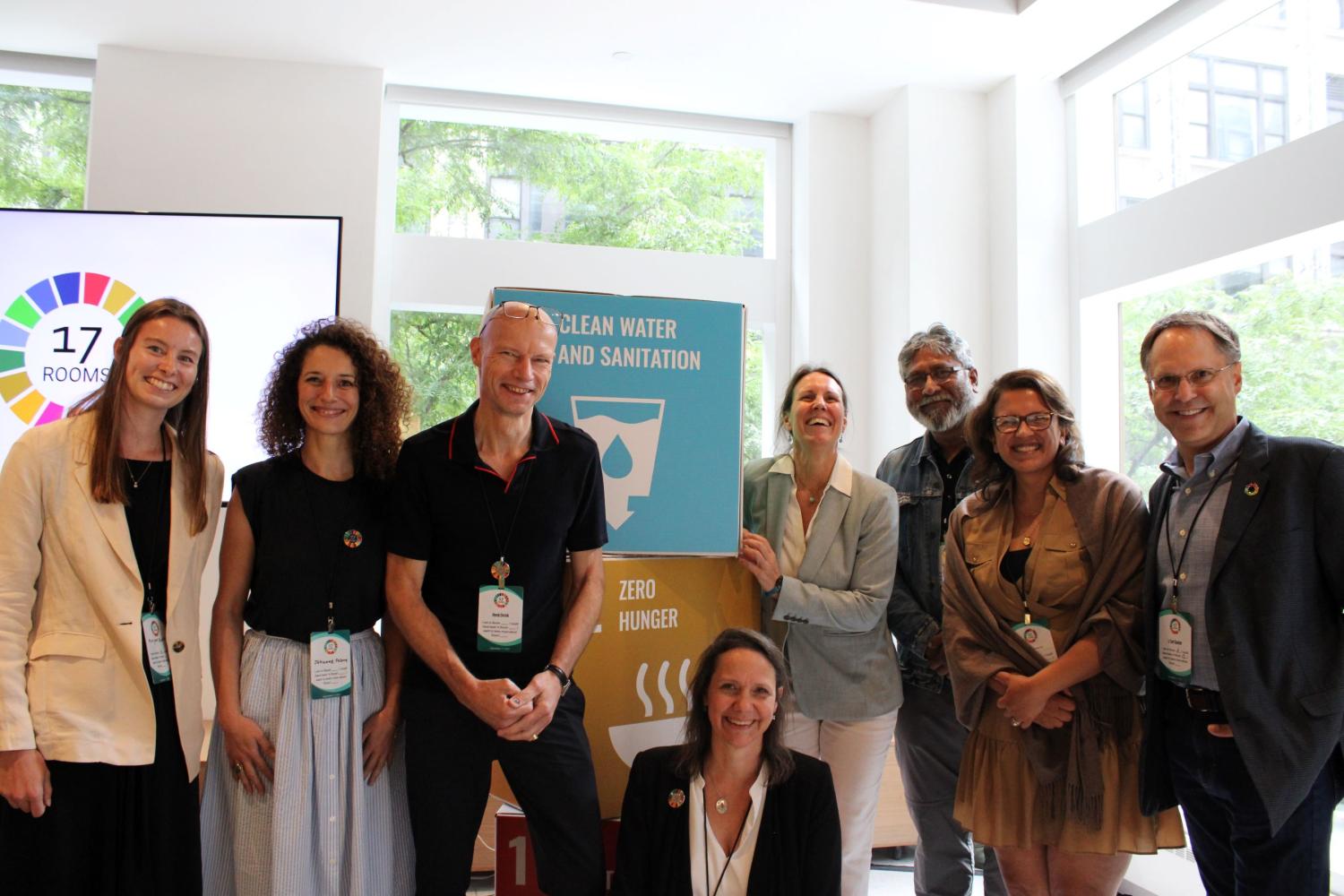
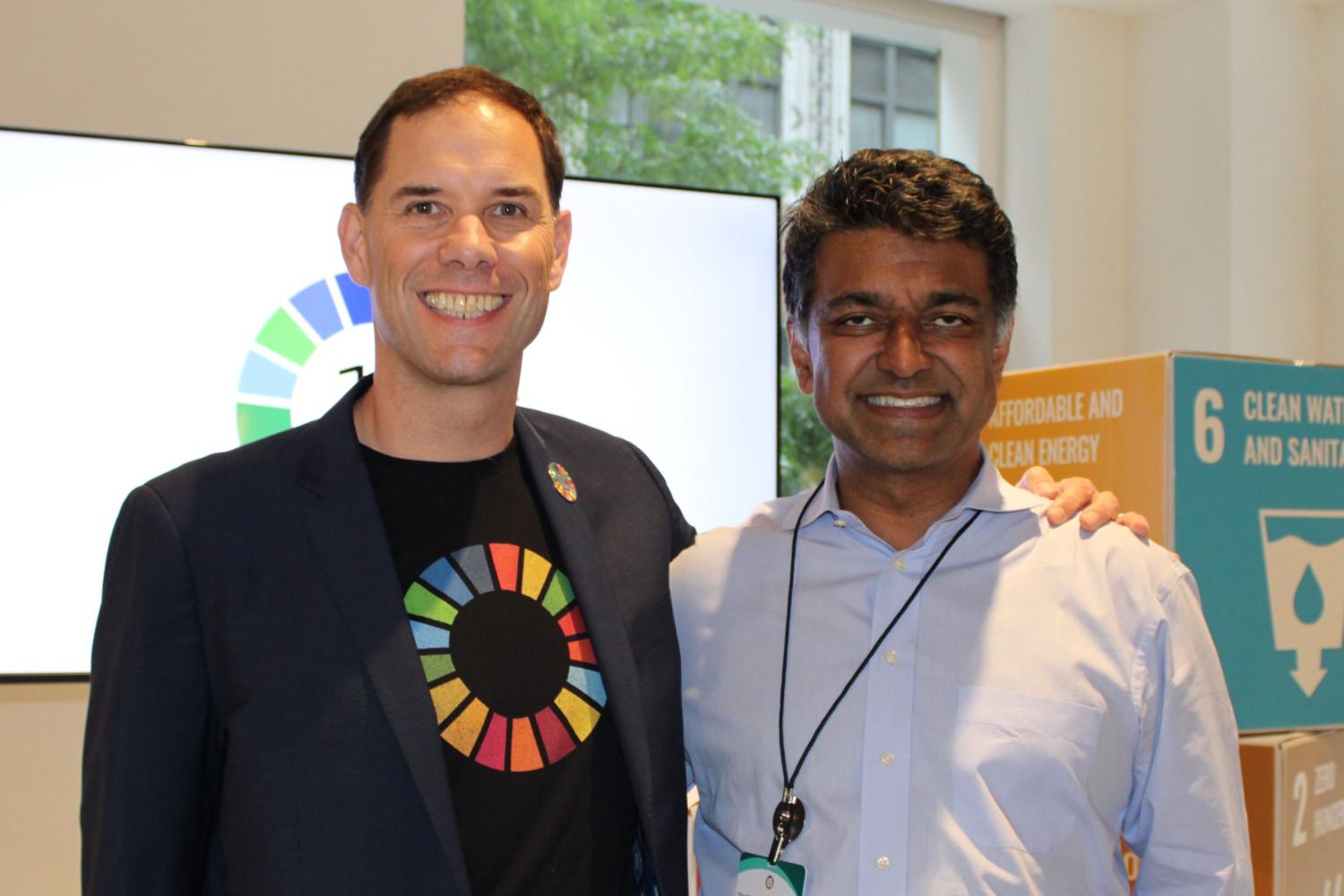
Action agenda summaries from the 17 Rooms 2023 global flagship
The following paragraphs summarize the action agendas put forward by each of this year’s 17 flagship Rooms. All Room co-leads and members are listed in the Appendix.
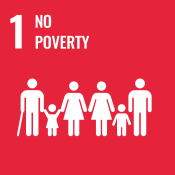 Room 1: Global Fund for digital cash transfers
Room 1: Global Fund for digital cash transfers
The world is off track to end extreme poverty by 2030. Progress has slowed, yet the evidence and technology now exist to eradicate it. Randomized controlled trials have demonstrated astonishing results for direct cash transfers to reduce poverty while new digital tools such as direct payment platforms coupled with artificial intelligence algorithms for the targeting of beneficiaries offer transparent, secure, affordable, and effective modes of cash delivery. Room 1 advanced a call for a Global Fund to scale digital cash transfers by tackling key design questions and crafting a concept note for such a fund. The Room proposes a fund focused on lump sum transfers, targeting people living in extreme poverty to enable concrete impacts within months, not years, as a complement to other poverty reduction efforts. To learn more, read Room 1’s concept note.
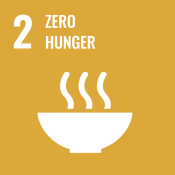 Room 2: Fortified whole grains
Room 2: Fortified whole grains
Vulnerable populations worldwide rely on grains for more than half of their caloric intake. Whole grains are a nutrient-dense and protective food, but when consumed in refined form become nutrient-poor and calorie-dense. Shifting a substantial portion of global grain consumption to whole grains can be one of the most significant and achievable improvements to diets and food systems worldwide. Room 2 aims to elevate this opportunity on the global agenda with a focus on low- and middle-income countries, especially in Africa, by developing an actionable plan to accelerate the uptake of fortified whole grain foods including maize, wheat, rice, millet, sorghum, and other crops. The Room convened a cross section of global experts to discuss priorities for strategic partnerships, demand creation, policy implementation, research and development, and funding mechanisms. Over the next 12-18 months, the aim is to scale up related fortified whole grain school feeding programs across Africa, based on learnings from pilots carried out in Rwanda, Burundi, and Kenya. This will include the development of a funding strategy and consumer research to inform a cross-country social and behavioral change campaign.
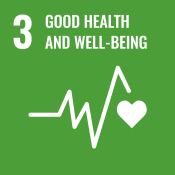 Room 3: Adaptive cities
Room 3: Adaptive cities
Climate-driven extreme heat will impact billions of urban residents globally by midcentury. Raising awareness and investment in nature-based and built cooling solutions can save lives, improve health and safety, and enhance productivity. Room 3 proposes to accelerate integrated and locally led solutions for urban adaptation, starting with the challenge of extreme heat and its health and social justice impacts. Cities such as Santiago, Chile, and their diverse local and global collaborators see an immediate need for integrated data to enable smart city approaches to design, planning, development, and implementation of cooling solutions. In 2024, starting in Santiago, the Room will develop an integrated data and analytics solution to inform near-term decisions and communications. The effort will build on existing capabilities, align with local priorities such as alert systems and green public spaces, involve young people as citizen scientists, and leverage big data and digital twins. A communications pillar will promote shared learning, scaling, and replication across cities. Proof of impact in 2024 will help motivate investments in digital, built, and natural infrastructure for adaptation. The targeted impact aims to set the stage for a broader multi-stakeholder initiative and movement of adaptive cities to deliver positive health, well-being, and thrive-ability outcomes across the SDGs.
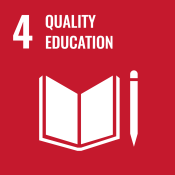 Room 4: Post-COP28 climate education roadmap
Room 4: Post-COP28 climate education roadmap
According to the Report on the 2022 United Nations’ Transforming Education Summit, more than 90 countries want to include climate change education in their national curricula. Now the challenge is to design climate education policy and implementation plans that are ambitious, realistic, and inclusive. The insights and experiences of trailblazing climate educators provide many of the answers. Room 4 will do two things over the next 12 months to ensure that teacher leadership remains at the center of designing and implementing the future of climate education policy at scale. First, the Room will launch an online platform, starting with 100 outstanding teacher-led and -tested climate education solutions at COP28, through the Teachers for the Planet global movement. Second, to ensure that the innovations of leading teachers are reflected in national policy processes for education reform, Room 4, along with educators from Teachers for the Planet and partners at UNESCO, the Global Partnership for Education, and Dubai Cares will work with a pioneering group of Ministries of Education to co-create a new Policy-Practice Translational Mechanism at the country level. This mechanism aims to test a simple, but important hypothesis: Climate education policies informed by teachers are better climate education policies for teachers and their students.
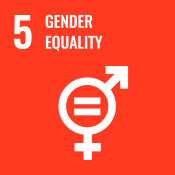 Room 5: Addressing climate and care simultaneously
Room 5: Addressing climate and care simultaneously
Climate change has exacerbated the caregiving responsibilities that largely fall to women and girls around the world and highlighted the need for greater societal and government attention to the provision of care services and infrastructure. Climate change stressors include increased incidence of food-, water-, and vector-borne diseases, loss of arable land and crop failures, and mental and physical stresses resulting from extreme weather events and associated economic shocks. However, local-level conversations about how to address care needs and climate change happen in silos. Room 5 members seek to help cities address both care and climate simultaneously by creating a “Top 10” menu of action options and developing a global network of learning labs to test them, in cities including Barcelona, Bogota, and Toronto.
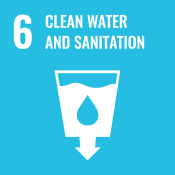 Room 6: New cross-SDG water narrative
Room 6: New cross-SDG water narrative
The U.N. convened its second Water Conference in March 2023—the first one having taken place more than 40 years ago in 1977. Over 10,000 attendees committed to more than 800 water actions across continents, backgrounds, and professions. The global diversity of commitments showed the world that water cuts across many historical institutional divides. Following an in-depth review of SDG 6 at the High-Level Political Forum in July 2023, U.N. Member States agreed to coordinate a water strategy across U.N. institutions. Room 6 welcomed this attention as the water crisis deepens, exacerbated by human failure to understand, value, and manage water. The Room argued that failure to act on water imperils not just SDG 6 but also progress toward all of the SDGs. The current water policy narrative is disconnected from the other SDGs due to low public awareness and limited coordinated global action. As such, Room 6 members will harness this rare moment to craft a new water narrative to propel water action across all 17 global goals. Room members will start this work at the COP28 water pavilion and continue it into 2024. The new narrative will aim to bring water to the top of the global agenda, embed water across the SDGs, and sow the seeds for global water action.
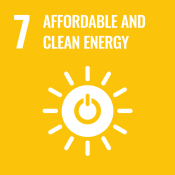 Room 7: Decarbonizing power and energy systems
Room 7: Decarbonizing power and energy systems
Increasing energy access in low and middle-income countries is key to reaching the goals of SDG 7, but ensuring that new energy is also clean and reliable is crucial to addressing climate change. While there are many actions and programs already in place (such as the just energy transition plans and Global Energy Alliance for the People and the Planet), ongoing assessments of elements, approaches, and implementation will help ensure efforts are taking advantage of new ideas, concepts, and creativity from across the globe. Room 7 will identify the human, social, and institutional barriers to decarbonizing power and energy systems and ideate potential solutions to those barriers through the development of new initiatives and frameworks that put people at the center of progress.
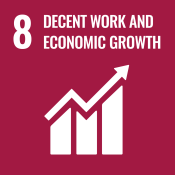 Room 8: Global green jobs index
Room 8: Global green jobs index
By urgently prioritizing the creation of green jobs, national economies can address the intertwined global challenges of climate change and economic inequality. For Global South countries in particular, the green economy provides a unique opportunity to reconfigure economic sectors and to leapfrog the transition to a sustainable future while providing livelihoods to its rising young population. Room 8 is working to develop a global Green Jobs Index that aims to help countries self-monitor progress, thereby creating an enabling environment for green jobs while steadily improving human capital. During 2023, the Room developed a business plan outlining a road map for developing the index. Part of this included identifying measurable pillars and indicators that are consistently available across countries and years. The index needs to be relevant and practical for countries to embrace its utility for influencing policy decisions, while having a governance structure that maintains independence and transparency. In 2024, the Room aims to mobilize resources, develop the first version of the index, and then test it in pilot countries through ongoing consultations with stakeholders.
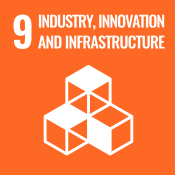 Room 9: Digital public goods for climate risk data analytics
Room 9: Digital public goods for climate risk data analytics
Room 9 aims to build resilient, inclusive, and sustainable compute infrastructure for climate risk-related early warning systems in Africa, for Africa, by Africans. The Room seeks to build democratized, cloud-based, and high-performance infrastructure and corollary professional capacity to facilitate policy-relevant modeling and simulation of the complex systems involved in climate risk scenario planning around food security, health equity, and responses to extreme weather events. This “Climateverse” of digital public goods will be developed through a three-year lighthouse project composed of four intersecting layers: 1) Create a democratized cloud-based data analytics and modeling/simulation environment and support the African professional capacity to use it, 2) Establish the climate models and data science to exploit a data commons composed of socio-economic data and earth and climate systems data, 3) Create data governance, provenance, and standards that ensure equity and interoperability, 4) Apply all of this, initially, to the integration of climate modeling into health surveillance, with a focus on health equity and social determinants of health. Data.org and Amazon Web Services Impact Computing will facilitate the partner organizations ready to build these four layers and welcome potential philanthropic partners to join and support the program.
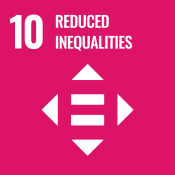 Room 10: Updating SDG 10 targets
Room 10: Updating SDG 10 targets
When established in 2015, SDG 10 marked a significant step forward in building urgency around the need to tackle inequality. However, despite a recent surge in research, measurement, social activism, government initiatives, and corporate commitments aimed at addressing global inequality, progress has been slow. In 2023, to scale international action toward combating inequality during the “second half” of the SDG era, Room 10 has been driving alignment around ongoing efforts to understand the barriers to progress for Goal 10. In 2024, Room 10 will work toward developing a net-zero equivalent target for inequality, taking into account lessons learned from the climate movement. Recognizing the growing interest from businesses in contributing to social and environmental causes, Room 10 will also work to reinforce the systemic and business risks associated with inequality, outline clear incentives, and offer guidance for private sector action on reducing inequality.
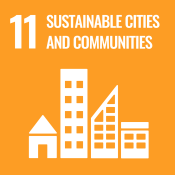 Room 11: SDGs for strategic innovation for community foundations
Room 11: SDGs for strategic innovation for community foundations
Room 11 aims to elevate recognition of the SDGs as a framework for strategic action for local priorities. For community foundations (CFs) in particular, using the SDGs for the discipline of setting population-level, timebound targets and measuring progress helps create a platform for collective leadership and impact. However, more work is needed to demystify the SDGs and promote their strategic value within a broader network of CFs in North America and globally. As a next step for progress in 2024, Room 11 proposes to develop a community of practice to promote the application of the SDGs to local leadership. CF leaders most familiar with the SDGs will hone and elevate frontier models of best practice and make these available to CF leaders less experienced with the SDGs to learn about and explore the value of the SDGs for local philanthropy.
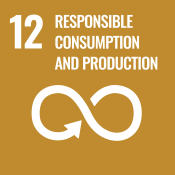 Room 12: Circular economy for the textile industry
Room 12: Circular economy for the textile industry
It has been estimated that over 100 billion garments are produced yearly for a world of 8 billion people—and it is widely believed that up to 30% of these garments never get sold. In this context, Room 12 gathered leaders across the textiles value chain to discuss ways to shift the industry toward more circular models of production and recycling. Room discussions revealed that clothing brands and upcycle platforms are interested in comprehensive approaches to accounting and valuation to help understand holistic company impact, including positive externalities and return on investment from shifts to circular modes of production. Meanwhile, industry stakeholders shared frustration with the fragmentation of efforts to promote sorting, recycling, and reuse. In 2024, the Room will advance action through two interconnected working groups. One group focuses on brands and platforms and aims to prototype an industry-standard approach to impact accounting and valuation. A second working group aims to develop and promote industry-wide consensus on common principles to shift the industry toward greater volumes of reuse and recycling.
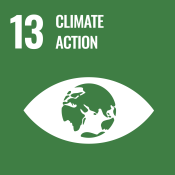 Room 13: Carbon removal in Global South countries
Room 13: Carbon removal in Global South countries
The world needs to remove 5 billion-16 billion tons of carbon annually by 2050. Consequently, there is growing demand, increased funding, and rising regulatory pressure for carbon removal. Countries in the Global South can play a vital role due to available land, renewable energy potential, and growing workforces. However, most of the global demand and regulations do not provide fair and equitable market access for global south solutions. Moreover, nowhere near enough finance is available at the right terms for investment in these solutions. To unlock market access and finance for global south economies and communities, Room 13 will build a wider consensus about the legitimacy of carbon markets as a valid and sustainable global climate solution, the value they offer to global south actors, and the role that the Global South can play in carbon removals. In addition, Room 13 seeks to contribute to the flow of investment in global south solutions by unearthing the key concerns and needs of investors and investees, thereby helping bridge their interests.
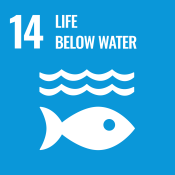 Room 14: Unlocking new ocean data and technologies to address climate-ocean change and ocean health and response
Room 14: Unlocking new ocean data and technologies to address climate-ocean change and ocean health and response
Ocean health is indispensable to human health, wealth, and well-being. In the face of climate change, biodiversity loss, and growing human needs, the need to protect and sustainably manage the ocean is more important than ever. The science is clear that humans are putting the ocean under unsustainable stress. Political will for ocean action is increasing, but increasing the quality, quantity, and applicability of ocean data is urgently needed to deliver on growing public and private sector commitments and to implement the most effective measures at global and local scales. Fortunately, a technological revolution in ocean data technologies is underway, expanding the frontiers of data and information collection and analysis at rapidly reducing cost. To maximize the potential of this revolution, Room 14 highlighted two key areas that require more coordinated data and information for management and decisionmaking: 1) Ecosystem and carbon cycling impacts of deep seabed mining, and 2) Climate risk and vulnerability modeling of ocean and coastal data. In 2024, Room 14 members will work to highlight and socialize priority actions in these areas and work with partners to generate illustrative case studies and recommendation sets that further illuminate and coordinate key data and information needs.
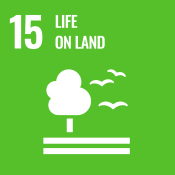 Room 15: Biodiversity benefits of sustainably produced food products
Room 15: Biodiversity benefits of sustainably produced food products
Room 15 seeks to advance critical sustainability challenges in physical commodity markets by developing a consensus around the technology and market infrastructure required to verify, trace, and differentially value commodities based on their ESG (Environmental, Social, and Governance) footprint. This would empower customers to influence market pricing, provide direct financial feedback to producers who have taken the risk of adopting more responsible practices, and unlock innovative forms of transition financing needed to de-risk and scale the adoption of sustainable practices. Room 15 will initially use specialty coffee as a proxy for commodities, setting an example for broader industries. The team will explore opportunities to discover, model, and pilot innovations in market infrastructure for specialty coffee required to enable “true” pricing. In parallel, Room 15 will advance conversations with other high-value agriculture commodities and supply chains for economically critical metal and mineral commodities.
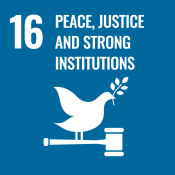 Room 16: Institutionalizing participatory and deliberative democracy
Room 16: Institutionalizing participatory and deliberative democracy
Room 16 started with the premise that governments around the world are suffering from a crisis of democracy. Too often, elections alone are failing to deliver the effective, accountable, and inclusive institutions needed to promote peace, justice, and sustainable development. In recent years, however, there has been a rapid growth of innovations in participatory and deliberative democracy. These efforts have demonstrated the ability to boost public trust, bridge divides, make government more inclusive, and deliver more equitable and effective outcomes. Anchored in a concern that most of these innovations have been implemented as one-off exercises, hence limiting impact, Room 16 aimed to institutionalize innovations in participatory and deliberative democracy so that these practices lead to long-term systemic change. The Room prioritized three complementary actions to accomplish this goal in 2024: 1) A donor innovation, impact, and learning program; 2) A program to develop and test evidence-based model legislation, policies, regulations, and implementation guidance; and 3) A network of international NGOs to continue supporting collaboration in the field. The Room 16 supplemental document describes these actions.
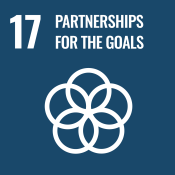 Room 17: Collective leadership to advance sustainable development
Room 17: Collective leadership to advance sustainable development
United in the belief that continuous development of human agency and leadership is the driving force that will facilitate system change and help advance long-term sustainable development outcomes, Room 17 argued that paradigms of leadership must evolve to meet future adaptive challenges across all SDGs. The group’s ultimate goal is to increase investments in developing collective leadership. This means investing in the development of people who have experienced inequity—and their allies who exercise agency and leadership across all levels of a system—and supporting them to collaborate and learn together in pursuit of justice and sustainability. By end-2024, Room 17 aims to elevate the global discussion about the importance of developing collective leadership, what it looks like to invest in it, and what donors can do differently. The Room is building out this case for change, developing a plan for bringing the discussion to key forums, and building a toolkit that includes a review of evidence on the role of collective leadership development in system change and case studies of places where collective leadership has changed systems. The Room 17 supplemental document presents a case for change to donors.
Box 2. Past year Room successes
In 2023, a range of successful action agendas and collaborations continued to emerge from previous 17 Rooms annual flagship cohorts. Some highlights include:
Room 17 (2021) – Forced Labor Open Risk Estimation Tool (FLORET): Two years after forging a ground-breaking partnership between leading institutional investors and experts on issues of forced labor and human trafficking, several members of Room 17 recently presented a waypoint prototype of FLORET—a digital public good that investors can use to estimate the company-level risk of forced labor within their portfolios. Built through collaboration between 2021 Room members, private sector data providers like Dun & Bradstreet and Institutional Shareholder Services, and technology partners like Google Data Commons, FLORET works by integrating information on the location of a company’s workforce, sectoral business models, and country-level governance environments.
Room 2 (2022) – Promoting insect-based products and frass fertilizer across the African continent: To accelerate the harmonization of continent-wide policies, standards, and training to produce insect-based protein across Africa, members of Room 2 helped initiate a Memorandum of Understanding between the International Centre of Insect Physiology and Ecology and the African Union’s African Organisation for Standardisation and multi-year funding from European Research Executive Agency (REA). Room 2 members have also played an active role in assisting the implementation of insect protein policies and standards at the national level, for example in the recent development and approval of new standards in Ethiopia to regulate the production, handling, and processing of insect-based animal feed and fertilizer.
Room 4 (2022) – Global education policy transformation for climate action: Teachers and education leaders in last year’s Room 4 advanced a comprehensive policy engagement roadmap to strengthen links between education and climate change sectors in the leadup to COP28 and beyond. This included helping shape the new Greening Education Partnership, informing 70 country commitments to including climate change education in national curricula, hosting regular ‘Teachers for the Planet’ convenings, and programming for an education-focused day at COP28.
Room 9 (2022) – Gender data cooperatives: Building on the success of a research visit and a pilot underway with Megha Mandli—an indigenous women farmers’ cooperative under the Self-Employed Women’s Association in India–members of Room 9 expanded application of the gender data cooperative model to two women’s organizations in Papua New Guinea and Tanzania, respectively. These new pilots will inform the development of a larger scale gender data cooperative incubator for up to 12 data cooperatives, with accompanying implementation and advocacy tools such as a forthcoming “How to Build a Data Cooperative” handbook.
Room 16 (2022) – International exchange on community-level urban violence prevention: A connection initially forged between two Room 16 participants in a virtual Room meeting grew into a strategic exchange on placed-based strategies for urban violence prevention. This included a team from Bristol-based Empire Fighting Change, a sport for development charity based in Bristol, U.K., travelling to Medellín, Colombia to learn the value of systems-level approaches and interventions to urban violence prevention pioneered by Medellín Resilience. A team from Medellín Resilience later travelled to Bristol to learn how Empire Fighting Chance combines sport and personal support to help transform young people’s lives.
Box 3. Beyond the flagship: The 17 Rooms-X movement
While the annual 17 Rooms flagship continues to cultivate diverse approaches to international-scale SDG challenges, it has also provided inspiration for—and interaction with—a growing number of regional and local actors mobilizing community-based leadership toward the SDGs.
The links between the 17 Rooms flagship and bottom-up 17 Rooms-X efforts were on full display at the United Nations SDG Pavilion on September 22, in a workshop co-hosted by the 17 Rooms initiative and the U.N. Office for Partnerships. The event brought together a range of current and past flagship Room leaders, 17 Rooms-X organizers, and potential collaborators to share insights and ideas for how new approaches to Room-type multistakeholder cooperation could help tackle SDG priorities across diverse communities and geographies.
The U.N. session offered an opportunity to highlight several new 17 Rooms-X use cases that took shape in 2023. Cepei, a Colombia-based think tank, convened the first 17 Rooms regional experiment in Latin America, setting the stage for future action-oriented SDG efforts in countries across the region. GivingTuesday’s global network of national civil society leaders began organizing 17 Rooms exercises in nine countries, bridging the world’s generosity movement with localized SDG ambitions. Fairfax County Public Schools in Virginia, U.S., collaborated with the 17 Rooms secretariat to pilot the first 17 Rooms exercise in a secondary school setting. Millennium Campus Network began rolling out student-led 17 Rooms-X experiments at up to 50 university campuses across five continents. Future Earth, a transdisciplinary global network of scientists committed to advancing research and action for people and planet, initiated a 17 Rooms exercise to surface and coordinate practical research collaborations.
In parallel, the 17 Rooms secretariat has continued to support the development of toolkits and peer exchanges. This included a May 2023 convening to distill learnings from an array of university-based 17 Rooms efforts, leading to lessons on the importance of people, preparation, purpose, products, and pathways for driving community-wide action.
Toward 2024
This year’s 17 Rooms flagship once again demonstrated the simple power of convening groups together around the practical aspects of advancing sustainable development—to listen, debate, and agree on what action to take next. While many people may feel increasingly overwhelmed by the scope of ambitions embedded in the SDG targets for 2030, the diverse leaders who convened in the flagship to craft action plans underscored a core premise of the 17 Rooms initiative: There is no single best form of SDG progress.
If the goals are like a mountain range that the world needs to climb, and the 17 Rooms platform aims to offer some version of a base camp, some problems certainly require a focus on better execution among key stakeholders—what we dub a “direct ascent.” But other problems may need a testing ground, where new propositions can be validated, or promising ideas trialed to inform broader implementation. Some problems might be so stuck that a most promising path is through a campfire approach—a concerted effort to bring diverse voices together to craft a new consensus that unlocks a better way forward.
In 2024, we will continue to support the bottom-up “17 Rooms-X” movement (see Box 3) while also updating the flagship’s approaches to bringing people together, with increased emphasis on big ideas that could quicken progress toward better 2030 outcomes. This could involve leaning in to the campfire approach, convening cross-sections of stakeholders to pursue fresh collective insights, while continuing to offer space for more action-ready testing grounds and direct ascents. We will also encourage ongoing emphasis on the cross-cutting challenges of climate change and disruptive technologies like artificial intelligence.
All told, 17 Rooms continues to show what can happen when groups of people harness their collective energies to lead change themselves, rather than passively observe or critique the actions of others. As people around the world write the second-half story of the SDGs, we hope the platform can continue to help leaders at all scales generate fresh insights, forge new bonds of human connection, and set forth on next steps of sustainable development action.
2023 flagship participants
In the spirit of informal conversations on a “first name basis,” names are listed alphabetically by first name. All participants attend 17 Rooms in their personal capacities.
Downloads
-
Acknowledgements and disclosures
This report was prepared by the 17 Rooms secretariat, which is co-chaired by Zia Khan of The Rockefeller Foundation and John McArthur of the Center for Sustainable Development at The Brookings Institution. Drafting was led by Jacob Taylor and John McArthur, with contributions from Alexandra Bracken, Daniel Bicknell, Angela Shields, and Clea McElwain. Zia Khan, Sarah Geisenheimer, and Nathalia dos Santos all provided key inputs. Junjie Ren at The Brookings Institution provided editorial support. The report was designed by Lynde Pratt of LP Design Collaborative. Photographs are courtesy of Junjie Ren, Ralph Alswang, and the U.N. Office for Partnership/Pier Paolo Cito. The secretariat thanks Margaret Biggs, Caren Grown, George Ingram, and Homi Kharas for helpful comments and review on earlier drafts of this report. The secretariat further thanks participants in the 17 Rooms 2023 flagship for contributing remarkable insights and ideas, which inspired the contents of this report. The secretariat is particularly grateful to the Room co-leads who provided such energizing leadership, feedback, and support for the 17 Rooms flagship throughout 2023. The Brookings Institution is a nonprofit organization devoted to independent research and policy solutions. Its mission is to conduct high-quality, independent research and based on that research, to provide innovative, practical recommendations for policymakers and the public. The conclusions and recommendations of any Brookings publication are solely those of its author(s), and do not reflect the views of the Institution, its management, or its other scholars. Support for this publication was generously provided by The Rockefeller Foundation. Brookings is committed to quality, independence, and impact in all of its work. Activities supported by its donors reflect this commitment. The Rockefeller Foundation is a pioneering philanthropy built on collaborative partnerships at the frontiers of science, technology, and innovation that enable individuals, families, and communities to flourish. The Rockefeller Foundation makes big bets to promote the well-being of humanity. Today, The Foundation is focused on advancing human opportunity and reversing the climate crisis by transforming systems in food, health, energy, and finance. For more information, sign up for The Rockefeller Foundation’s newsletter at www.rockefellerfoundation.org.
The Brookings Institution is committed to quality, independence, and impact.
We are supported by a diverse array of funders. In line with our values and policies, each Brookings publication represents the sole views of its author(s).
